Unit 3 Social Custom- A Dinner Party说课稿
四年级下册英语教案Unit3:与朋友分享蛋糕的交际Lesson1重大版
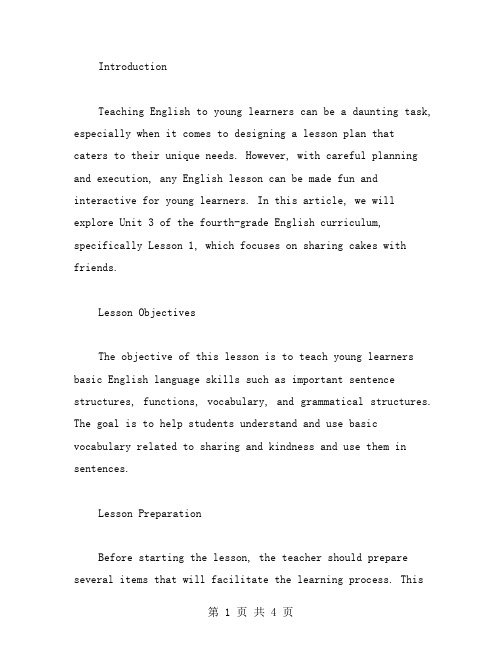
IntroductionTeaching English to young learners can be a daunting task, especially when it comes to designing a lesson plan thatcaters to their unique needs. However, with careful planning and execution, any English lesson can be made fun and interactive for young learners. In this article, we will explore Unit 3 of the fourth-grade English curriculum, specifically Lesson 1, which focuses on sharing cakes with friends.Lesson ObjectivesThe objective of this lesson is to teach young learners basic English language skills such as important sentence structures, functions, vocabulary, and grammatical structures. The goal is to help students understand and use basic vocabulary related to sharing and kindness and use them in sentences.Lesson PreparationBefore starting the lesson, the teacher should prepare several items that will facilitate the learning process. Thisincludes the curriculum guidelines for the lesson, printouts of key phrases, and vocabulary words, a board or digital screen for writing, and any other materials that will stimulate students' learning, such as flashcards or interactive games. The teacher should also check that the classroom environment is conducive to learning and is free of distractions.Lesson Procedure1. Warm-up ActivityAt the beginning of the lesson, the teacher should greet the students and engage them in a fun warm-up activity. The activity can be anything that gets the students' attention and prepares them for the lesson ahead, such as singing a song or playing a game.2. Introduction of Key VocabularyNext, the teacher should introduce the key vocabulary of the lesson. In this case, the vocabulary related to sharing cakes with friends. The teacher should use visual aids suchas pictures or flashcards to depict the vocabulary words and illustrate their meanings.3. Explanation of Grammar Structures and PhrasesOnce students have a basic understanding of the vocabulary, the teacher should explain relevant grammar structures and phrases. The teacher should provide clear and concise examples and reinforce learning through repetitionand practice activities.4. Role-play ActivityAfter introducing key vocabulary and relevant structures, the teacher should engage students in role-playing activities. This can include students working in pairs or small groups, acting out or miming phrases related to sharing and kindness.5. AssessmentFinally, the teacher should conduct a formative assessment to evaluate students' learning. Depending on the level of students, teachers can choose different forms ofassessment such as asking questions, completing worksheets, or conducting a group discussion.ConclusionIn conclusion, teaching English to young learners can be a fun and exciting experience with the right tools, preparation, and execution. The fourth-grade English curriculum, Unit 3, Lesson 1, focuses on teaching students about sharing food with friends. By following an effective lesson plan, teachers can help students learn basic vocabulary and structures related to sharing and kindness. With time and practice, young learners will develop their English language skills and use them in their everyday lives.。
大学体验英语综合教程2 第三版 Unit 3 电子教案

Unit 3AdvertisingObjectives:★first listen, and then talk about the advantages and disadvantages of advertising ★read about the role of the Ad Council in the U. S. and the uses & abuses of advertisements★write about the functions of public service advertisements★learn about conjunctions and connective words★write a personal ad★visit Culture Salon for an introduction to advertising photographyI Passage A The Ad Council at a Glance1.SummaryThe Ad Council was founded during World War II to help sell War Bonds. After the war it continued to address pressing social issues with public service advertisements (PSAs). Since 1942 it has created over 1000 advertising campaigns on such issues as forest fi res, safe and sober driving, minority education, crime, drugs, child abuse, recycling, and AIDS. Some of its most famous messages are “Only You Can Prevent Forest Fires,” “Friends Don’t Let Friends Drive Drunk,” and “A Mind is a Terrible Thing to Waste.” Seat belt usage rose from 21% to 70% after the Crash Test Dummies were introduced. The Ad Council’s current major campaigns are to help children achieve their full potential and to encourage Americans to support the war on terrorism.2. Language Points1. memorable: which is worth rememberingExamples:This was indeed the most memorable day of my life.The experience was memorable for all of us.2. inspire: encourage in (someone) the ability to actExamples:We need a new captain — someone who can inspire the team.Success inspires us for fresh efforts.3. take action: start to do something, begin to actExamples:The government has promised to take quick action on the energy crisis.The police took fi rm action to deal with the riots.4. testify: bear witness; serve as proofExamples:The teacher testifi ed to the pupil’s ability and willingness to work hard.Her real face testifi ed to her guilt.5. positive: practical and constructive; that defi nitely helpsExamples:He always has some positive ideas on company policies.He takes a very positive attitude when correcting pupils’ mistakes.6. launch: get started; set goingExamples:The government has launched a new plan to build more houses.The firm launched the new product with a big advertising campaign.7. experience:: observe or participate in events as a basis of knowledge; suffer or know as experienceExamples:She experienced a genuine feeling of quiet happiness.Our country has experienced great changes in the last thirty years.8. minority: a small part of a population which is different from the rest in race, religion, etc.Examples:Laws were passed to protect religious minorities.People of 21 minorities live in the area.9. estimate: form judgments about; calculate (the loss, value, size, etc.) Examples:She made plans and estimated means and resources.I asked three building fi rms to estimate for the repairs to the roof.10. category: division or class in a complete system or groupingExamples:Helen groups all people into two categories: those she likes and those she dislikes.This book falls into the category of reference book.11. rally: (cause to) come or bring together for a purposeExamples:To rally people is to bring them together for a great united effort.The whole nation rallied to help the government with the war.12. recruit: get somebody to do somethingExamples:The wartime government fi rst recruited men (into the force) from nonessential industries.The coach recruited nine boys for the baseball team.13. symbol:a sign, shape, image, or object which represents a person, idea, value, etc.Examples:The lion is often used as a symbol of courage.The dove is the symbol of peace.14. stimulate: make ... more active or alertExamples:He was stimulated into greater efforts.Praise stimulated the child to study hard.15. make a / the difference:: see or show (two things) to be differentExamples:If you do so, it will make a great difference.The extra money would have made all the difference.16. motivate: provide someone with a reason or cause for doing something Examples:He was motivated only by his wish to help, and expected nothing in return.These children just sit around all day doing nothing; they need something to motivate them.17. concerning: about; with regard toExamples:He wrote to me concerning a business arrangement.This is, I believe, all the news concerning the society.18. abuse: wrong use; bad or cruel treatmentExamples:Here are some recent abuses of the word.Child abuse is a punishable offence.19. adopt: take (an idea, custom, etc.) and useExamples:I like your methods of teaching and shall adopt them in my school.Congress adopted the new measures.20. speak for: express the thoughts, opinions, etc. of ...Examples:Speaking for myself, I fi nd the housing quite satisfactory.He is old enough to speak for himself.21. approximately: very near (to); very nearlyExamples:Approximately 50 people attended the lecture.It is approximately ten o’clock.22. pledge: a solemn promise or agreementExamples:He was under pledge to spend the money in the best way.He gave a pledge to handle the affair in a friendly manner.23. grief: great sorrow or feelings of sufferingExamples:She went nearly mad with grief after the child died.No one could console them in their grief.24. threaten: warn to hurt, kill or punish somebodyExamples:The whole nation is threatened with starvation.The war threatened the peace of the whole world.25. decline: going from a better to a worse position, or from higher to lower Examples:Our business has gone into a decline this year.There is a sharp decline in sports in our town.26. distribute: divide among several or manyExamples:The teacher distributed the examination papers to the class.He distributed the prizes among the winners.27. inform: tell; give information toExamples:I informed him (about) where to go.He would like to be informed of any new developments.3.Important sentences1. Our slogans and characters are more than memorable —they raise awareness, inspire individuals to take action, and save lives.Not only are our slogans and characters enjoyable, they also make people be aware of social issues, take part in and contribute to social activities.2. The War Advertising Council, a private, non-profit organization, was founded to rally support for World War II-related efforts..The War Advertising Council, which was not established by the government or for profi t , was aimed at encouraging people to support World War II.3. The Ad Council’s mission is to identify a select number of significant public issues and stimulate action on those issues through communications programs that make a measurable difference in our society.The Ad Council’s main goal is to decide on a few of vital well-chosen public issues and encourage people to do something that helps to improve the society through effective communications programs.4. The Ad Council reached out to the federal government as well as important national nonprofits with an offer to create and also distribute their crisis-related messages to media outlets nationwide..The Ad Council appealed to the American government and the major national non-profit organizations for producing and distributing messages about the 9-11 disaster to various media outlets throughout the country.II Passage B The The Uses and Abuses of Advertisements1.SummaryThe author asserts that advertisements in our world are ubiquitous. People and firms advertise for all sorts of reasons, and the list is constantly expanding. Advertising plays a crucial role in the sponsorship of major events by large companies, and the revenues needed for most print publications to survive. Advertisementsenable people to widen their choices and chances in whatever they wish to obtain or discard.But the author says that as useful as it is, advertising is sometimes abused. Misleading the public is the most common form of abuse. For example, cigarette advertisers seek to attract consumers by advertising fashion, good living and other aspects of “success.” Television advertising abuses viewers by using hard-selling tactics and relentless bombardment.The author concludes that advertisement can be useful or destructive, depending on its use. “People advertise because they need to,” he says. “It i s only when they advertise falsehood and misleading information that abuse comes in. We cannot escape this onslaught of advertisements, but we can use our own intelligence to weed out the bad ones.”nguage Points1.abuse: put to wrong useExamples:I never expected that he would abuse the trust I placed in him.She is continually abusing her authority by getting other people to do things for her.2.elaborate: very detailed and complicated; carefully prepared and ?nished Examples:A rather elaborate analysis was required to determine the cross-over values.The curtain had an elaborate pattern of flowers.3. economical: using money, time, goods, etc., carefully and without waste Examples:This is not a very economical method of heating.If you have a large family, it’s more economical to travel by car than by train.4. undisputed: that cannot be doubted or questionedExamples:He is the undisputed leader of his party.He’s the undisputed champion of the singi ng contest.5. play a major role: be important in making changes happenExamples:Their contributions played a major role in the formation of the Trade Union.“Pink-collar tribe” refers to women who play a major role in certain professions such as office workers, secretaries, models, etc.6. stage: perform or arrange for public showExamples:At the middle of this year the government staged a huge military parade.Activists staged a protest outside the parliament.7.carry on: continue doing somethingExamples:The board of the directors decided to carry on the discussion next day.Don’t waste time! Carry on with your writing.8. come in contact with: touch or be nearExamples:When did you first come in contact with Prof. Willington?As people travel more now, they come in contact more frequently with people of different cultures.9. bargain: agreement in which both or all sides promise to do something for each otherExamples:If you promote our goods, we will give you a good discount as our part of the bargain.The management and employees eventually made a bargain.10. in short: by way of summaryExamples:This is our most disastrous and embarrassing defeat ever; in short, a total failure.Thi ngs couldn’t be worse, financially; in short, we’re bankrupt.11. discard: throw (something) out or awayExamples:Read the manufacturer’s guidelines before discarding the box.Remove the seeds from the melon and discard them.12. in the midst: surrounded byExamples:The house sets down in the midst of quiet suburban homes.She found him in the midst of a group of his usual friends.13. authorities: (often pl.) a person or group having the power to give orders or take actionExamples:The health authorities are investigating the matter.I shall have to report this to the authorities.14. turn a blind eye to: deliberately ignore something that you know should not be happening?Examples:Don’t turn a blind eye to matters that concern the people’s welfare.We can no longer claim ignorance about the effects of pollution or continue to turn a blind eye to it.15. disguise: change the usual appearance or character of (someone or something) in order to hide the truthExamples:He disguised himself by shaving his head and wearing a false beard.She disguised herself as a man, but she couldn’t disguise her voice.16. cut down on: reduce the amount of somethingExamples:Finally they have hired a new person. I hope this will cut down on our? work a little.What they are supposed to do is to cut down on government spending.17. be based on: use particular information or facts as a point from which to develop an ideaExamples:Their working strategy is based on a study of consumer spending.Scientific theories must be based on facts.18. eliminate: remove (especially someone or something that is not wanted or needed)Examples:The police have eliminated two suspects from their enquiry.A move towards healthy eating could help eliminate heart disease.19. be taken in: be completely deceived by someone so that you believe a lie Examples:I am not to be taken in by your lies.You must be very simple to be taken in by such a story.20. come in: become necessary or importantExamples:I also need someone to persuade my parents that it’s a good idea —that’s where you come in.We need financial advice —that’s where Kate comes in.21. weed out: get rid of people or things that are not very goodExamples:He weeded out one by one the book he did not want.There are too many candidates. Just weed out all the undesirables.3.Sentence Explanation1. This list goes on, and it is expanding every day.he list of different kinds of advertisements is very long, and it is getting longer and longer.2. Without them acting as sponsors we would not be able to stage international sporting events.Large companies provide the necessary financial support needed for international sporting events, and in return they get to advertise their products at these sporting events.3. As useful as it is, advertisements are sometimes abused by unscrupulous people.Although advertisements have many advantages, some people use them in a dishonest way, usually for a bad purpose.4. Yet these advertisers blatantly ignore facts and promote their productsnonetheless.Though these advertisers are consciously aware of the harm of smoking, they choose to overlook the obvious facts and keep on advertising cigarettes.5. Besides giving us a mental jolt they methodically numb and abuse our minds until we watch them without actually seeing and hear their chatter without actually listening.Not only do advertisements surprise us and distract us from the middle of an exciting program, they also attack us mentally to such an extent that we simply feel we don’t see or hear anything when the same advertisements are being repeated.6. Presently advertisement on television is based on hard-selling and relentless assault on the viewers.Now advertisers usually promote their products by putting viewers under extreme psychological pressure and attacking them with repetitive advertising of the same prodIII General Writing: Conjunctions and Connective Words(连词)We sometimes wish to join short, choppy sentences to form longer sentences. One way to join two ideas is to use a coordinating conjunction and a comma. Examples:The trip was fine, and I learned a great deal from it.The television picture is blurred, but we will watch the football game anyway.She wants to practice her Italian, so she is going to Italy for the entire summerCoordinating Conjunctions:and, but, yet, for, so, orWe can also use a special kind of adverb to join ideas. This special kind of adverb is called a conjunctive adverb because it is partly a conjunction and partly a adverb. A conjunctive adverb joins ideas together in an emphatic way. It is used with a semicolon when both ideas are independent and can stand alone.Common Conjunctive Adverbs:furthermore, however, nevertheless, thereforeExamples: He received an A on his term paper; furthermore, the instructor exempted him from the final.He rarely seems to study; nevertheless, he always gets A's.。
《Unit 3 Using Language》第1课时示范课教案【高中英语人教版】
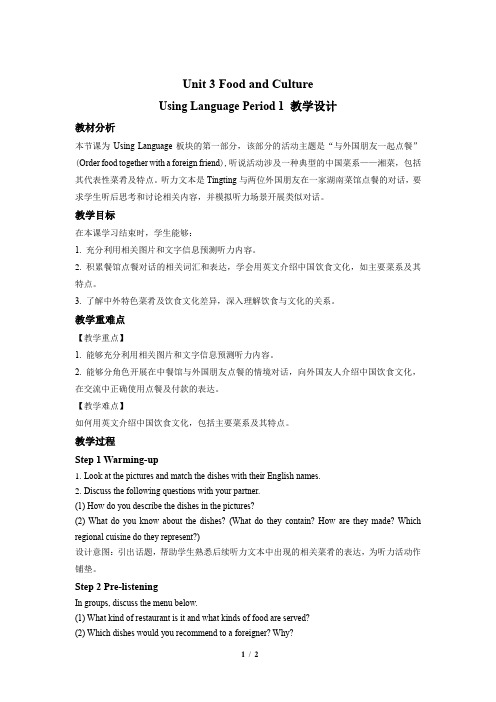
Unit 3 Food and CultureUsing Language Period 1 教学设计教材分析本节课为Using Language板块的第一部分,该部分的活动主题是“与外国朋友一起点餐”(Order food together with a foreign friend),听说活动涉及一种典型的中国菜系——湘菜,包括其代表性菜肴及特点。
听力文本是Tingting与两位外国朋友在一家湖南菜馆点餐的对话,要求学生听后思考和讨论相关内容,并模拟听力场景开展类似对话。
教学目标在本课学习结束时,学生能够:1. 充分利用相关图片和文字信息预测听力内容。
2. 积累餐馆点餐对话的相关词汇和表达,学会用英文介绍中国饮食文化,如主要菜系及其特点。
3. 了解中外特色菜肴及饮食文化差异,深入理解饮食与文化的关系。
教学重难点【教学重点】1. 能够充分利用相关图片和文字信息预测听力内容。
2. 能够分角色开展在中餐馆与外国朋友点餐的情境对话,向外国友人介绍中国饮食文化,在交流中正确使用点餐及付款的表达。
【教学难点】如何用英文介绍中国饮食文化,包括主要菜系及其特点。
教学过程Step 1 Warming-up1.Look at the pictures and match the dishes with their English names.2.Discuss the following questions with your partner.(1) How do you describe the dishes in the pictures?(2) What do you know about the dishes? (What do they contain? How are they made? Which regional cuisine do they represent?)设计意图:引出话题,帮助学生熟悉后续听力文本中出现的相关菜肴的表达,为听力活动作铺垫。
八下英语说课稿U3
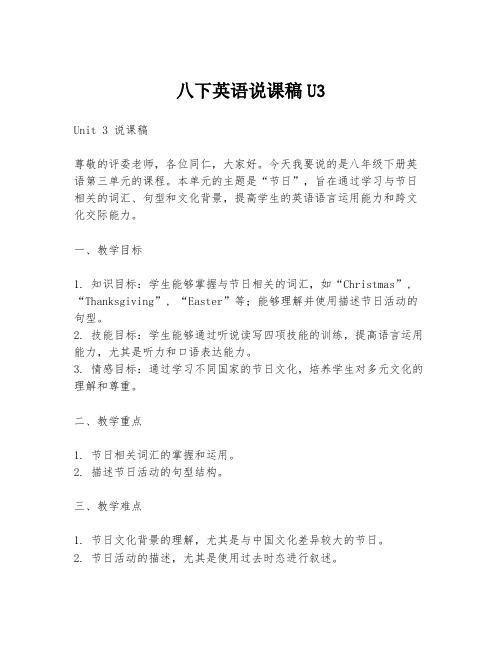
八下英语说课稿U3Unit 3 说课稿尊敬的评委老师,各位同仁,大家好。
今天我要说的是八年级下册英语第三单元的课程。
本单元的主题是“节日”,旨在通过学习与节日相关的词汇、句型和文化背景,提高学生的英语语言运用能力和跨文化交际能力。
一、教学目标1. 知识目标:学生能够掌握与节日相关的词汇,如“Christmas”, “Thanksgiving”, “Easter”等;能够理解并使用描述节日活动的句型。
2. 技能目标:学生能够通过听说读写四项技能的训练,提高语言运用能力,尤其是听力和口语表达能力。
3. 情感目标:通过学习不同国家的节日文化,培养学生对多元文化的理解和尊重。
二、教学重点1. 节日相关词汇的掌握和运用。
2. 描述节日活动的句型结构。
三、教学难点1. 节日文化背景的理解,尤其是与中国文化差异较大的节日。
2. 节日活动的描述,尤其是使用过去时态进行叙述。
1. 情景教学法:通过创设节日情景,让学生在实际语境中学习和使用语言。
2. 合作学习法:鼓励学生分组合作,通过讨论和角色扮演等活动,共同完成学习任务。
3. 任务型教学法:设计具体的语言任务,如制作节日卡片、编写节日故事等,让学生在完成任务的过程中学习语言。
五、教学过程1. 导入(Lead-in):通过展示不同节日的图片,激发学生的兴趣,引入节日主题。
2. 新课呈现(Presentation):教授节日相关词汇,解释节日文化背景,展示节日活动图片,引导学生理解句型结构。
3. 练习(Practice):通过填空、连线、角色扮演等活动,让学生练习使用新词汇和句型。
4. 应用(Application):设计一个任务,如让学生描述自己最喜欢的节日,或者编写一个节日故事,让学生将所学知识应用到实际中。
5. 总结(Summary):回顾本节课的重点和难点,确保学生对节日词汇和句型的掌握。
6. 作业(Homework):布置相关的练习题和创造性作业,如写一篇关于节日的短文,或者制作一个节日主题的手抄报。
现代大学英语第一册教案unit3

现代⼤学英语第⼀册教案unit3Lesson Three Message of the LandI. Teaching ObjectivesExplain the style of interviews;Make the students re-think the changes in social values, attitudes, and life styles with the development of industrialization;Explain two word-formation skills:○a Noun/V+ …ful Adj○b…Un?+ Adj AntonymIntroduce some cultural differences in translation to arouse the students? awareness of these phenomena;II. Teaching Process2.1I ntroduction to the TextThis text is different from the previous two, which are both stories. Our present text is an essay in a very broad sense of the word, for it was written down by the writer who interviewed a farmer and his wife. Since the end of World War II it has become popular for writers to interview people, record what they say and, after some, not too much, editing, publish these people?s stories in book form.The style of such “writing” is colloquial. The language is straightforward. The sentences are generally short. When we read the text, we feel as if we were sitting face to face with the couple, listening to their stories and experiences, sharing joys and sorrows.Do you know what these nicknames refer to?Land of the Rising Sun Land of the Rose Land of the Shamrock Land of Cakes Land of Golden Fleece Land of Thistle Land of the stars and stripesShamrock [′??mr ?k] 三叶草(爱尔兰的国花)Fleece ⽺⽑Thistle [′θ?s ?l] 苏格兰的国徽stripe[stra ?p] 条纹AuthorPira Sudham is considered Thailand's leading English language writer, who was nominated 提名 for the 1990 Nobel Prize for Literature. His literary works are concerned with social-economic-political changes occurring in Thailand. Widely read and highly acclaimed, his books have given an expedient voice to the poor and the voiceless.Bangkok, population 8,538,610 (1990), is the capital and largest city of Thailand. The city is located on the east bank of the Chao Phraya River, near the Gulf of Thailand. Bangkok is one of the fastest-growing, most economically dynamic and socially progressive cities in Southeast Asia. It is also one of the world's most popular tourist destinations. Bangkok is the economic center of Thailand.The city contains many Buddhist 佛教temples. Buddhism Scotland Japan U.S.A Ireland England Australiais Thailand's main religion. 94% of Thai people are Buddhist. The other are Muslim, Catholic罗马天主教的or Chinese. Monks are more suited to reach enlightenment because they follow a strict way of life far from material attachment. Their life is based on 227 monastic rules and 5 major precepts, i.e. no sex, no lies, no robbery, no alcohol, no killing.In a temple, some men have been monks for decades but there are also some men who became monk only a short time ago. They do it in order to bring merit to their parents ("THAM BUN"). A boy is not a man if he hasn't been a monk once in his life. Even the King of Thailand Rama 9had been a monk for one month. In old days this period was three months. Now it can be only a few weeks or a few days. Some families still refuse to marry their daughter if the future husband hasn't ever been amonk. It means that he isn't ripe enough.In a bus, seats in the back are reserved to monks. If a woman is sitting there, she should leave because a woman cannot touch a monk.2.2 Main Parts of Text APart One (P1 to P7): This part is the wife?s attitudes, and can be further divided into two small sections. Section One, from Paragraph 1 to Paragraph 3, mainly tells us about her family members and how their children left. Section Two, from Paragraph 4 to Paragraph 7, deals with the changes that the wife cannot adjust to.Part Two (P8 to P11): This part is the husband?s views. The man?s speech is shorter but touches something deeper --- what he thinks are the roots of all evils. He also tells us what joys he finds in life and in farming.2.3 Detailed Discussion of the Textto belong to sb: to be owned by sb.eg: Who does the Mobil phone belong to?It was I who stayed with my parents till they died.(1)Learn how to use the emphatic form “it is/was…that/who…”Eg. It was my sister who went to teach in a village school upon graduation.My husband moved into our house as is the way with usin Esarn. (1)(When we got married) my husband came to live in our house. It was the tradition here in Esarn that the bridegroom新郎should come to live with the bride?s family.Q: how is the custom in Esarn different from Chinese tradition?In traditional Chinese families, usually it is the daughter who will leave her parents after getting married and move into the husband?s family. Therefore, traditionally, daughters have no rights to inherit the property of their parents? family. In Esarn, it seems to be the opposite.“as” in a relative clauseAs is known to all, China first created the use of compass.( as – subject of the clause)In a bus, seats in the back are reserved to monks. If a woman is sitting there, she should leave because a woman cannot touch a monk.infancyn. a. early childhood婴⼉期b. early stage of development or growth初期,摇篮期In the past, many children died in infancy.基因的;遗传的;Genetic engineering is still in its infancy.a. infantile[′?nf(?)nt??l] 婴⼉的,幼⼉的n. infant幼⼉;婴⼉In the past, many children died in infancy.The rest, two boys and two girls, went away (1)Our other children –two boys and two girls left as soon as we had the money to buy them jeans.“to buy jeans for them”在这⾥具有⼀种象征意义,象征着孩⼦们刚⼀长⼤,条件刚⼀允许,他们就⽴即离开了家。
现代大学英语听力课本答案unit1-unit3

Unit 1 Social CustomsTask 1A.1. She wanted to see St. Paul’s Cathedral.2. She was so surprised because she saw so many Englishmen who looked alike.3. They were all wearing dark suits and bowler hats, carrying umbrellas and newspapers.4. Because she had often read about them and seen photographs of them, who alllooked as if they were wearing a uniform.5. No, he didn’t.6. He used the English saying “It takes all kinds to make a world” to prove his opinion.B.If all the seas were one sea, what a great sea it would be! And if all the trees were one tree, what a great tree it would be! And if this tree were to fall in the sea, what a great splash there would be!Task 2A.1. people were much busier2. colder than England, minus thirty degrees, last longer3. much more mountainous, much higher and much more rocky, more beautiful4. tend to be more crowded5. the houses, smallerB.1) T 2) T 3) F 4) F 5) FTask 3A.1) In the US, people usually dance just to enjoy themselves, they don’t invite otherpeople to watch them.2) Usually eight people dance together.3) Because people form a square in dancing with a man and a woman on each sideof the square.4) He usually makes it into a song.5) They wear old-fashioned clothes.B.1) F 2) T 3) F 4) F 5) TC.1) eight people form a square, on each side of the square.2) What they should do, makes it into a song, sings it.3) don’t have much time to think4) old-fashioned clothes, pretty to watch.Task 41) It was a time to celebrate the end of winter and the beginning of spring.2) They burned the picture of their kitchen god to bring good luck.3) The custom s aid the brides must wear “something old, something new, somethingborrowed, and something blue” to bring good luck.4) Because they could not eat meat, eggs or dairy products during Lent, so they triedto use up these things before Lent began.5) It was a straw man made by children in Czech, it was a figure of death.6) People brought their animals to church. And before the animals went into thechurch people dressed them up in flowers and ribbons.Task 5A.1) F 2) T 3) F 4) T 5) F 6) T 7) TTask 6A.1) b 2) a 3) c 4) aB.1) family unit, process, change, used to be, the extended , the nuclear2) job patterns, progressed, agricultural, industrial, forced, jobopportunities, split up3) traditio nal, 缺,family, other living arrangementsC.1) mother, father, children, and some other relatives such as grandparents, living inthe same house or nearby.2) only the parents and the children.3) previously married men and women marry again and combine the children fromformer marriages into a new family.Task 7A.1) c 2) c 3) a 4) b 5) c 6) c 7) cTask 8A.1) a 2) c 3) b 4) c 5) c 6) b 7) c 8) bB.1) T 2) T 3) F 4) F 5) T 6) F 7) F 8) F 9) T 10) FTask 9Social custo ms and ways of behaving change. But they do not necessarily always change for the better. Things which were considered impo lite many years ago are no w acceptable. Just a few years ago, it was considered impo lite behavio ur for a ma n to smoke o n the street. No man who thought o f himself as being a gentleman wo uld make a foo l o f himself by smok ing when a lad y was in the roo m.The important thing to remember about social custo ms is not to do anything that might make other people feel unco mfortab le—especially if they are yo ur guests. There is a story about a rich nob leman who had a very formal dinner party. When the food was served, one of the guests started to eat his peas with a knife. Other guests were amused or shocked, but the nob le man calmly p icked up his knife and began eating in the same way. It wo uld have been bad manners to make his guest feel foolish or unco mfortab le.Unit 2 WeatherTask 11) b 2) a 3) dTask 2A.1) T 2) F 3) FB.1) d 2) c 3) cC.Climate, reputatio n, extraord inary, unreliab le, dry, wet, clear, dull, hot, cold, bad, mildTask 3I. the co untryTrees, grass, lakes and steamsII. A. 1. concrete, iro n, steel2. take in the heat during the day and thro w o f heat into the air at nightB. Warmer wintersCar engines , electrical app lianceIII. A. air pollutio n may stop sunlight fro m reaching the earthB. 1. Ice near the North and South po les to melt2. to be slo wly fo lded and peop le living in these cities to mo ve tohigher land.Task 4A.1) b 2) cB.night, delight, morning, warning, gray, way, red, headC.1) F 2) T 3 )FTask 51) c 2) b 3) d 4) c 5) cTask 6A.1) F 2) T 3) F 4) T 5) F 6) TB.incred ib le, one minute, kilo meter, destroyed, lifted up, carried away, killed, injuredTask 7A.1) b 2) a 3) bB.1) It has been nice weather during the day, but it is going to change at night.2) Fine weather in southern Europe and not so nice in Northern Europe.C.For todaySoutheast England Maximu m temperatures of around 21 degreesSouthern Scotland 26 degrees Celsius b y mid-afternoo n Brighto n 23 degrees Celsius by early afternoo n Mid lands Light showers aro und midday Northwest of Scotland 15 ho urs of lo vely sunshineFor the weekendSpain Clo ud y b ut mainly dry with sunny periods, 23 degrees CelsiusGreece Heavy rain, 17 degrees CelsiusFrance Cloud y with rain, maximu m temperatures o f 22 degreesNorthern Ireland 34 degrees CelsiusMost of England 32 degrees CelsiusTask 9A. 1)ⅹ2)ⅹ3)√ 4)ⅹ5)ⅹ6)√ 7)√B.[f]→[c]→[a]→[d]→[b]→[e]C.1) F 2) T 3) F 4) FD.1) d 2) bTask 10Undo ubted ly, Tibet is one o f the harshest places for human existence. It is cool in summer but freezing co ld in winter. In Lhasa, the mildest city in Tibet, temperatures may exceed 29 degrees Celsius in summer while plummeting to -16 degrees Celsius in winter! Sun radiatio n is extremely strong in Tibet. The sunlight in Lhasa is so intense that the city is called Sunlight City. The thin air can neither block off nor retain heat so that thereare great temperature extremes o n the same day! The average temperature in northern Tibet is sub zero and winter arrives in October until the fo llo wing May or June. July and August are the best time to visit the area, enjo ying warm temperatures, intense sunshine, beautiful scenery and festive events. May, June and September represent the tourist season in east Tibet. In winter, roads are all blocked by heavy sno w. Landslides and rock falls freq uently occur, which will make travel difficult.Unit 3 Social IssuesTask 1A.1. Stress on the job costs American companies as much as $150 billion a year in lowerproductivity, unnecessary employee sick leave, and higher medical costs.2. The most stressful professions are those that involve danger and extreme pressureand those that carry a lot of responsibilities without much control.3. The best way to deal with stress is through relaxation, but sometimes the onlyanswer is to fight back or walk away.B.1. Three-quarters2. psychologists, doctors3. nervousness, anger, frequent illness, forgetfulness, mental problemsTask 2A.1) give in so easily to hijackers’ demands.a) threaten to blow up a plane, commit some other outrage.b) hold out against this kind of blackmail, always have terrorists, Start executingterrorists automatically.c) be prepared to face the consequences of evil.2) a) It’s the lesser of two evils. Terrorists have proven often enough that they reallymean business.b) Innocent lives, threatening the innocent will achieve its endsB.She implies that if the first speaker was one of the victims of terrorism, she would want the government to give in to the demands so that she wouldn’t die.Task 3A.1) thirty-five, natural lights, a small window, hot, airless, very noisy.2) Mexico3) ought to, shouldn’tB.1) It is located in a narrow street with five-and six-storey buildings eight kilometersfrom downtown Los Angeles.2) This factory makes shirts and jeans.3) She’s already been working for ten hours, but she won’t stop for another two hours.4) She can’t complain about those things because she is an illegal immigrant.Task 4A.social trends1) marked differencesa) one hour more every day, three hours more every week.b) 1%, cleaning and ironing, keep household accounts, do repairs or improvementsc) 30%2) leisure activities, watching television, 20 hours a week, going for walks, Swimming,British womenB.Unlike the other couples, Carla has always kept her own accounts and Adrian has always done his own housework. Neither of them like watching television very much and they both like swimming.Task 5A.How a city in Japan solve the problem of garbage disposal.160 million, every year, 10%, 10%, the rest,public cooperation.1) garbage that can be easily burned, kitchen and garden trash.2) electrical appliances, plastic tools, plastic toys3) are poisonous, cause pollution, batteries4) bottles and glass containers that can be recycled5) mental containers that can be recycled6) furniture and bicycleson different days, on request, fertilizer, to produce electricity, recycled, cleaned, repaired, resold cheaply, given awayB.1) The garbage will be taken to a center that looks like a clean new office building orhospital. Inside the center, special equipment is used to sort and process the garbage.2) Official from cities around the world visit Machida to see whether they can usesome of these ideas and techniques to solve their own garbage disposal problems. Task 61. They were talking about Mrs. Carter.2. She was a tall, handsome woman who used to come into the shop at least twice aweek.3. She lived alone in a large house on an old farm—about three miles from the shop.4. He was absolutely certain, otherwise he would never call the police. His evidencewas this: First, he saw her do it; second, he found the things in her bag; third, she had done it before.5. Because two young people saw her. The shopkeeper believed that if they didn’tpunish her, young people would think that stealing didn’t matter.6. The judge thought that it was a difficult case from a humanitarian point of view.The excuses he found for her were: First, the woman was old and she lived alone—she was lonely. Second, she wasn’t poor—she was well-known for her generosity to charities and she didn’t need to steal. The items were only wor th a pound or two. Third, she pleaded not guilty and said she didn’t know that she had done it.Task 7A.not all modern cities are alike, modern city1) a single high-density centre, skyscraper, motorways, as far as you can see.2) the low-density multi-center city, a large collection of a number of small centres,shopping centres, factories, businesses, skyscrapersB.1) He thinks that the second type (the Los Angeles model) is more sensible.2) He considers it highly likely that the kind of city we know now will completelydisappear.Task 8A.1) He thinks that this country’s problems all come from inflation, which is the resultof the Democrat’s careless spending.2) No, she doesn’t agree with Ned. She believes that the problem is unemployment.If the government cuts spending too much, people will fall into a vicious circle of more unemployment and fewer taxpayers to share the burden.3) She agrees with Barbara. She believes that unemployment is a big problem,especially in the big industrial ci ties. And the government isn’t doing very much to help the big industries out.4) He believes in the free market system rather than government regulation orprotection. He thinks that without a lot of government interference everything will be okay.5) N o, they think it’s bad for the weak, the poor and the unprotected / it’s bad for theunderprivileged.B.More and more money, come from somewhere, higher taxes and high pricesTask 9A.1) The problem is whether or not the inner city—the core of most urban areas—willmanage to survive at all.2) They moved to the suburbs in search of fresh air, elbow room, and privacy.3) As a result, suburbs began to sprawl out across the countryside. Many citiesbegan to fall into disrepair. And many downtown areas existed for business only.4) The result was that urban centers declined even further and the suburbs expandedstill more.5) Because from the decision of the Taylors and many other young couples, we cansee that some people may be tired of spending long hours commuting, and they may have begun to miss the advantages of culture and companionship provided by city life.B.1) F 2) T 3) F 4) F 5) T 6) TC.1) middle-class, tax money, neighborhoods2) Crime, public transportation3) housing construction costs, was allowed to, constructedTask 10A.1) 54, 20, 1980, 70,0002) 30, 19803) a newspaper article, to research the market4) another few months, in April 1981, a 1500 sq. ft5) third, Canada, America, 20%, £1 million6) 20, 70, 3B.1) F 2) T 3) F 4) F 5) TC.1) He was deeply involved in the present job and rather enjoyed himself. He thoughtthe shop was his own little baby and thought it was fun to serve behind the counter. However, he also thought that there was a lot more hard work than he was used to; he was working over the weekend doing his books. He called his old job “boring trips to Manchester to sell vast quantities of PVC”.2) He thought that there was far more job satisfaction, and believed that he wasmaking money, rather than making money for other people.3) He’s about to diversify into commercial distribution of imported and domesticallyproduced wine and wines he’s producing himself.Task 11I could hear the guard blowing his whistle, so I ran on to the platform and up to the train. Luckily, someone saw me coming, a door opened, and I jumped on while the train was moving out of the station. “Phew!” I thought. “That was hard work!” I was sure the other passengers could hear my heart beating; it was so loud, and I was in a cold sweat.After a while, I recovered, and had a look at the other passenger. The compartmentwas full, but I was the only one standing. The people in the carriage turned their eyes away as they noticed me looking at them. All except one, a beautiful woman sitting in the corner. I saw her watching me in the mirror. Automatically, I adjusted my tie. She had seen me running for the train: maybe this was my lucky day after all. I prepared to say hello.She spoke first, however. “Would you like my seat?” she asked. “Y ou look rather ill.” That was the day on which I realized I was getting middle-aged.。
(整理)初中英语八年级下册Unit3第一课时说课稿.
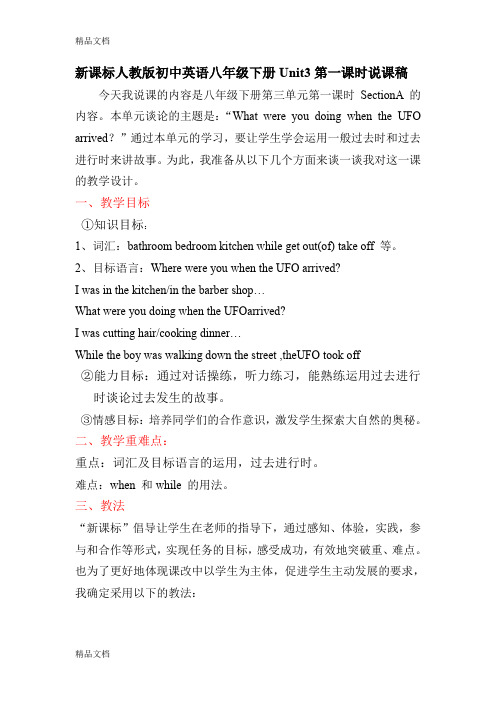
新课标人教版初中英语八年级下册Unit3第一课时说课稿今天我说课的内容是八年级下册第三单元第一课时SectionA的内容。
本单元谈论的主题是:“What were you doing when the UFO arrived?”通过本单元的学习,要让学生学会运用一般过去时和过去进行时来讲故事。
为此,我准备从以下几个方面来谈一谈我对这一课的教学设计。
一、教学目标①知识目标:1、词汇:bathroom bedroom kitchen while get out(of) take off 等。
2、目标语言:Where were you when the UFO arrived?I was in the kitchen/in the barber shop…What were you doing when the UFOarrived?I was cutting hair/cooking dinner…While the boy was walking down the street ,theUFO took off②能力目标:通过对话操练,听力练习,能熟练运用过去进行时谈论过去发生的故事。
③情感目标:培养同学们的合作意识,激发学生探索大自然的奥秘。
二、教学重难点:重点:词汇及目标语言的运用,过去进行时。
难点:when 和while 的用法。
三、教法“新课标”倡导让学生在老师的指导下,通过感知、体验,实践,参与和合作等形式,实现任务的目标,感受成功,有效地突破重、难点。
也为了更好地体现课改中以学生为主体,促进学生主动发展的要求,我确定采用以下的教法:1、脚手架的原则:在学习目标语言时,采用脚手架的原则,引导学生逐步感知、体验,然后去实践。
2、小组竞赛法:1b的听后巩固,我采用小组竞赛的形式,用记者采访的形式进行,评出最好的一组。
这样既激发了学生的兴趣,又培养了集体荣誉感。
3、任务型教学及合作探究法:学完1a、1b之后,学生已对过去进行时有了初步的感性认识,接下来我将呈现一组句子,让学生分组合作探究过去进行时这一语法的构成及用法。
Unit3 A birthday party说课稿23
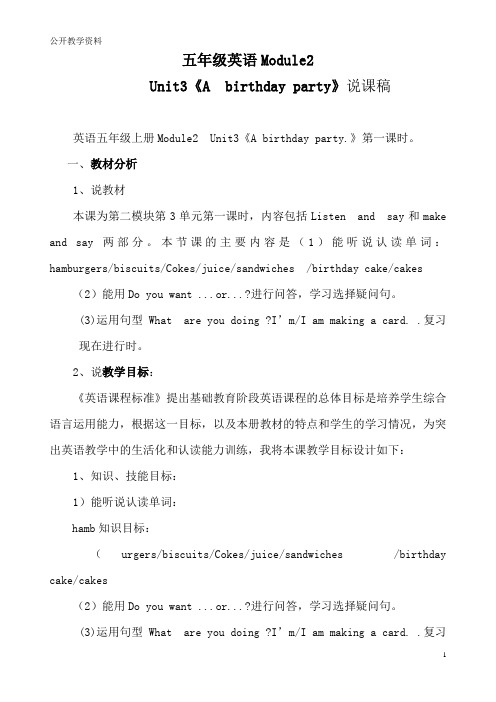
五年级英语Module2Unit3《A birthday party》说课稿英语五年级上册Module2 Unit3《A birthday party.》第一课时。
一、教材分析1、说教材本课为第二模块第3单元第一课时,内容包括Listen and say和make and say两部分。
本节课的主要内容是(1)能听说认读单词:hamburgers/biscuits/Cokes/juice/sandwiches /birthday cake/cakes (2)能用Do you want ...or...?进行问答,学习选择疑问句。
(3)运用句型What are you doing ?I’m/I am making a card. .复习现在进行时。
2、说教学目标:《英语课程标准》提出基础教育阶段英语课程的总体目标是培养学生综合语言运用能力,根据这一目标,以及本册教材的特点和学生的学习情况,为突出英语教学中的生活化和认读能力训练,我将本课教学目标设计如下:1、知识、技能目标:1)能听说认读单词:hamb知识目标:(urgers/biscuits/Cokes/juice/sandwiches /birthday cake/cakes(2)能用Do you want ...or...?进行问答,学习选择疑问句。
(3)运用句型What are you doing ?I’m/I am making a card. .复习现在进行时。
2.能力目标:全体学生能用所给句型询问别人正在做什么。
部分学生能熟练运用所学单词句型练习选择疑问句。
3.、情感态度与价值观目标:在了解单词的基础上培养他们热爱班集体,和同学融洽相处的意识。
4、说教学重点难点:a、结合新课程标准和本课的教学目标,我把本课的重点设定为:使学生能在图片的帮助下学会一些食物和饮料的单词。
b、依据英语学科特点和五年级年级学生当前认识水平,我将教学的难点设定为:使学生能运用所学句型了解其他人想要什么。
餐桌礼仪英语 八年级英语介绍西方餐桌礼仪作文
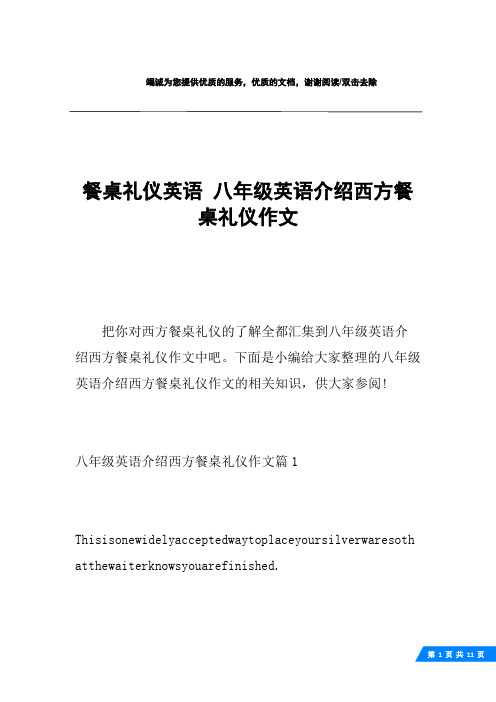
竭诚为您提供优质的服务,优质的文档,谢谢阅读/双击去除餐桌礼仪英语八年级英语介绍西方餐桌礼仪作文把你对西方餐桌礼仪的了解全都汇集到八年级英语介绍西方餐桌礼仪作文中吧。
下面是小编给大家整理的八年级英语介绍西方餐桌礼仪作文的相关知识,供大家参阅!八年级英语介绍西方餐桌礼仪作文篇1Thisisonewidelyacceptedwaytoplaceyoursilverwaresoth atthewaiterknowsyouarefinished.Itispolitetowaituntileveryoneisservedtostarteating, unlesseveryonehastheirfoodexceptforoneortwopeoplean dtheysuggestthateveryonebegin.Itispolitetowaituntileveryoneisfinishedeatingbefore leavingthetable.Itisnotpolitetoburpatanytime,andifyoudo,itispolitet oexcuseyourself("excuseme.").chewwithyourmouthclosed.Don'ttalkwithfoodinyourmouth.Don'tputyourelbowsonthetable.whenthesituationisinformal,Americansaregenerallyrel axedaboutetiquette.Ifyoushouldmakeabigmistake,mostp eopleprobablywon'tevennotice.sorelax,andeatup!八年级英语介绍西方餐桌礼仪作文篇2westernreferstowesterneuropeancountriesdietcuisine. westernetiquette.Today,Iintroducetoyoutoeatwesterns tylefoodetiquette.whenseated,thebodyupright,elbownotplacedon,maynot.u seyourforkandknife,fork,therighthandholdstheknife;w henthecuttingthings,keeptheforkinthelefthandholdthe food,righthandwithaknifecutintosmallpieces,forkintheentrance.Donotsipthesouptoeat,chewwhentoshutup.Don 'tlickthelipsorsmackingsound.overheating,canbecoole dbeforeeating,notmouthblown.Acupofcoffeewhenreadyto addmilkorsugar,addthefollowingtousetspstirring,Tspw illbeplacedonthecoffeesaucers.Drinkcupsshouldputhis right,lefthandendsaucer,directmouthtodrink,donotuse aspoontoscoopaspoonfulspoonfulofdrink.westernfoodisnotonlyakindofetiquette,isalsoakindofc ivilization.Thewesternstylefoodetiquette,youlearn?八年级英语介绍西方餐桌礼仪作文篇3TAbLemANNersATADINNerpArTy:peoplewhogotoaformalwest erndinnerpartyforthefirsttimemaybesurprisedbytablem annersinwesternculture.Knowingthemwillhelpyoumakeag oodimpression.havinggoodtablemannersmeansknowing,fo rexample,howtouseknivesandforks,whentodrinkatoastandhowtobehaveatthetable.besideyournapkinyouwillfinda smallbreadrollandthreeglasses—oneforwhitewine,onefortheredwine,andoneforwater.The rearetwopairsofknivesandforksonthetable,forksonthel eftandknivesintherightoftheplate.whenyouseetwospoon s,thebigoneidforthesuopandthesamlloneforthedessert. Theknifeandforkthatareclosesttoyourplatearealittebi tbiggerthantheonesbesidethem.whenyousitdownatthetab le,youcantakeyournapkin,unfolditandputitonyourlap.I nchineseyousometimegetahot,dampclothtocleanyourface andfaceandhands,whinch,however,isnatthecustominwest erncountries.Dinnerstartwithasmalldish,whichisoften calledastarter.simepeoplepraybeforetheystarteating, andotherpeoplemaykeepsilentforamoment.Thenyoucansay "enjoyyourmeal"toeachotherandeverybodystarteating.F orthestarter,whichyoueatwiththesmallerpair,youkeept heknifeinyourrighthandandtheforkinyourleft.Afterthe starteryouwillgetabowlofsoup—butonlyoneboelofsoupandneveraskforaseconfserving.Th enextdishisthemaincourse.manywesternersthinkthechic kenbreastwithitstenderwhitefleshisthebestpartoftheb ird.somepeoplecanusetheirfingerswhentheyeatingchickenorotherbirds,butnevertouchbeeforothermeatinbones. Itispolitetofinisheatingeverthingonyourplate,sodon' ttakemorefoodthanyouneed.Attable,youshouldtrytospea kquietlyandsmilealot,butdonotlaughallthetime.mostwe sternerslikesoftdrinkiftheywilldrivehome.manyofthem drinkwhiteorredwinewiththefood.whendrinkingtosomeon e'shealth,youraiseyourglasses,buttheglassesshouldno ttouch.Thecustomoftoastinginsomepartsofchinaistofin ishthedrinkatonce,butwesternersusuallytakeonlyasip. Fordrinkingduringadinner,thebestadvicisnevertodrink toomuch.Tablemannerschangeovertime.Theyfollowthefas hionoftheday.beside,tablemannersareonlyimportantatf ormaldinnerparties.Ifyou'renotsurewhattodo,youcanal waysfollowyourhosts.Althoughgoodmannersalwaysmakeyo ulookgood,youdonotneedtoworryaboutalltheseruleswhil ehavingdinnerwithyourfriendsorfamily.八年级英语介绍西方餐桌礼仪作文篇4peoplewhogotoaformalwesterndinnerpartyforthefirsttimemaybesurprisedbytablemannersinwesternculture.Know ingthemwillhelpyoumakeagoodimpression.havinggoodtab lemannersmeansknowing,forexample,howtouseknivesandf orks,whentodrinkatoastandhowtobehaveatthetable.besi deyournapkinyouwillfindasmallbreadrollandthreeglass es—oneforwhitewine,onefortheredwine,andoneforwater.The rearetwopairsofknivesandforksonthetable,forksonthel eftandknivesintherightoftheplate.whenyouseetwospoon s,thebigoneidforthesuopandthesamlloneforthedessert. Theknifeandforkthatareclosesttoyourplatearealittebi tbiggerthantheonesbesidethem.whenyousitdownatthetab le,youcantakeyournapkin,unfolditandputitonyourlap.I nchineseyousometimegetahot,dampclothtocleanyourface andfaceandhands,whinch,however,isnatthecustominwest erncountries.Dinnerstartwithasmalldish,whichisoftencalledastarte r.simepeoplepraybeforetheystarteating,andotherpeopl emaykeepsilentforamoment.Thenyoucansay"enjoyyourmeal"toeachotherandeverybodystarteating.Forthestarter, whichyoueatwiththesmallerpair,youkeeptheknifeinyour righthandandtheforkinyourleft.Afterthestarteryouwil lgetabowlofsoup—butonlyoneboelofsoupandneveraskforaseconfserving.Thenextdishisthemaincourse.manywesternersthinkthech ickenbreastwithitstenderwhitefleshisthebestpartofth ebird.somepeoplecanusetheirfingerswhentheyeatingchi ckenorotherbirds,butnevertouchbeeforothermeatinbone s.Itispolitetofinisheatingeverthingonyourplate,sodo n'ttakemorefoodthanyouneed.Attable,youshouldtrytospeakquietlyandsmilealot,butd onotlaughallthetime.mostwesternerslikesoftdrinkiftheywilldrivehome.many ofthemdrinkwhiteorredwinewiththefood.whendrinkingto someone'shealth,youraiseyourglasses,buttheglassessh ouldnottouch.Thecustomoftoastinginsomepartsofchinai stofinishthedrinkatonce,butwesternersusuallytakeonl yasip.Fordrinkingduringadinner,thebestadvicisnevert odrinktoomuch.Tablemannerschangeovertime.Theyfollowthefashionofth eday.beside,tablemannersareonlyimportantatformaldin nerparties.Ifyou'renotsurewhattodo,youcanalwaysfoll owyourhosts.Althoughgoodmannersalwaysmakeyoulookgoo d,youdonotneedtoworryaboutalltheseruleswhilehavingd innerwithyourfriendsorfamily看过八年级英语介绍西方餐桌礼仪作文的相关知识的人还看了:1.餐桌礼仪英语作文中西方餐桌礼仪英语作文2.关于餐桌礼仪的初二英语作文3.关于餐桌礼仪的英语作文4.餐桌礼仪英语作文5.中国的餐桌礼仪初中英语作文最后,小编希望文章对您有所帮助,如果有不周到的地方请多谅解,更多相关的文章正在创作中,希望您定期关注。
Unit 3 Dinner Party
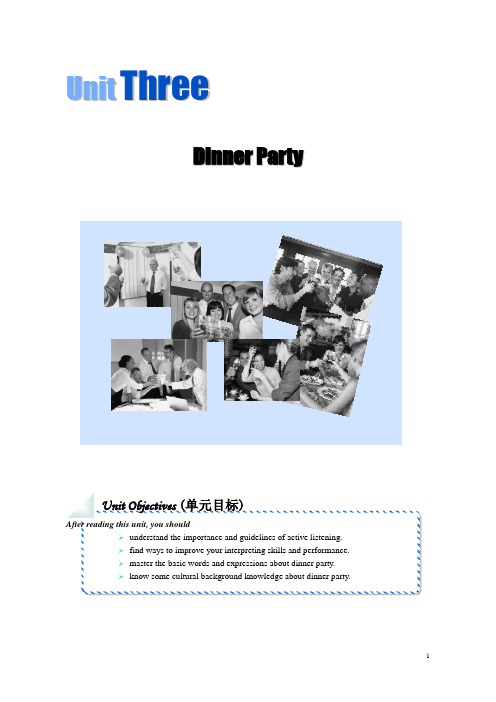
U n i t T h r e eD i n n e r P a r t yUnit Objectives (单元目标)After reading this unit, you should➢understand the importance and guidelines of active listening.➢find ways to improve your interpreting skills and performance.➢master the basic words and expressions about dinner party.➢know some cultural background knowledge about dinner party.PreparingI. Interpreting Skills (口译技能)Read the following presentation about active listening and try tounderstand the guidelines for active listening. Then complete thefollowing task:1. Listen to the passage, “Restaurant Etiquette” and answer the followingquestions:1) What is the main idea of the speech?2) At American restaurants, what are you usually served before you order?3) Why do some customers ask for a “doggiebag”4) Does every statemake its own lawsabout the sale ofalcohol in America?5) How much tip isusually expected inAmericanrestaurants?2. Listen to the passage again and try to catch the key words and details, thenretell the story in your own words.Decoding Training (I): Active Listening(积极听入)Decoding in Interpreter’s TrainingInterpreting is a decoding-memorizing-encod ing (解码-记忆-编码) process. Decoding is the first step interpreting. To reconstruct ideas clearly and effectively, interpreters must first of all understand them correctly. An interpreter needs acute listening and understanding. If interpreters’Decoding Effort fails, the other efforts become meaningless, so does the whole interpreting process.In the context of interpreting, an interpreter should be aware tha“to hear”is not merely to know all the words that are being spoken, but to grasp the main ideas of the original speech, for it is meaning that is to beinterpreted, not the words. The pure understanding of words alone is not sufficient for interpreters to reconstruct ideas effectively. Interpreters must be able to seize meaning when they listen to the speaker, and they must therefore listen actively.Three Guidelines for Active ListeningBoth CI and SI require concentrated listening or active listening instead of ordinary listening, which means that the interpreter avoids all distractions, concentrating on the job at hand. To listen actively, the interpreter’s brain must be active. It must perceive the sounds correctly and constantly focus on the information conveyed by the sounds. In order to maintain active listening, interpreters are suggested to follow the following three guidelines(原则).1. Listen to the Meanings instead of WordsWhat the speaker tries to convey(传达)and what the listener is interested in is not the words but themessage. To render the speaker ’s idea is interpreter’s top priority(首要任务). Therefore, interpreters are expected to follow the speaker closely and catch the idea while listening.2. Listen for both Content and AttitudeThe total meaning of message consists of both idea and feeling. The speakers choose their own sentence structures and speak in their own tone to express their idea. The same sentence may mean differently by differentspeakers or by the same speaker who speak in different tones. Interpreters, therefore, shall consider both the content(内容)and the speaker’s attitude(态度).3. Listen with Ears, Eyes and HeartInterpreting is a highly demanding profession. Listening is the first step in interpreting. Interpreter’s decoding decides whether or not the speaker’s message can be correctly transferred. Interpreters shalllisten with undivided attention and with the intention to receive the intended message. What they shall resort to is not simply their ears, but also their eyes and heart.Three Methods to Listen ActivelyTo understand more accurately the speaker’s intended message, interpreters must pay constant and careful attention. To improve the efficiency of active listening, interpreters often utilize(利用)several methods to help them focus on listening and collecting information. Following are some suggested methods for active listening.1. Sit or Stand Comfortably UprightIn the course of interpreting, interpreters usually have to sit or stand beside the speaker, or sit in the booth(口译箱). Interpreter’s sitting or standing posture will surely exert animpact on their listening. In order to keep alert and limit distractions(分心), it is advisable that interpreters first of all make sure they are in a comfortable position.2. Observe the Speaker’s Body LanguageAs we all know, people speak in both verbal language and body language(身体语言). The speaker’s message shall be understood on the basis of his choice of words and his body language. Speaker’s bodylanguage like gestures (手势), eyecontact(眼神)and facial expressions(表情)sometimes gives hints(暗示)and tells the true story. Speaker’s facial expressions may tell the listener what he really mean. 3. Try to Visualize the WordsVisualization(视觉化)is a tactic of conceiving ideas in the mind through pictures or images. By visualizing the speaker’s words, interpreters may identify(识别)the speaker’s main idea more easily. Such a skill helps the interpreter focus attention on the meaning of words used rather than the forms of the words.II. Phrase Interpreting (短语口译)Work on the following words and phrases. Interpret them into Chineseand English respectively.A. English to Chinese1. Business luncheon2. Soft drink3. Buffet reception4. Gourmet5. Preservative-free6. Gain popularity7. Propose a toast 8. Continental breakfast9. Junk food 10. French friesB. Chinese to English1、款待2、美味佳肴3、忌讳4、招牌菜5、晚宴6、菜系7、用筷子 8、用餐举止9、酸辣汤 10、酸奶III. Sentence Interpreting (句子口译)A. English to Chinese1. Sichuan food is famous for its numerous varieties of delicacies and strong flavors, and is best known for being spicy-hot.2. Cantonese cuisine /food emphasizes lightcooking with seemingly limitless range of ingredients. 3. The careful coordination (of such a series of delicate activities )as selecting ingredients, mixing flavors, timing the cooking, controlling the heat and finally,laying out the food on the plate for the table are the typical characteristics of Chinese food.4. Nearly endless variety of natural ingredients and methods of cooking are employed in Chinese cooking.5. May I propose a toast to the health of His Excellency the Ambassador and Mme Smith?B. Chinese to English1 谢谢史密斯先生的热情洋溢的欢迎词,感谢欧中贸协的盛情邀请和热情款待。
派对英语小学教案中班
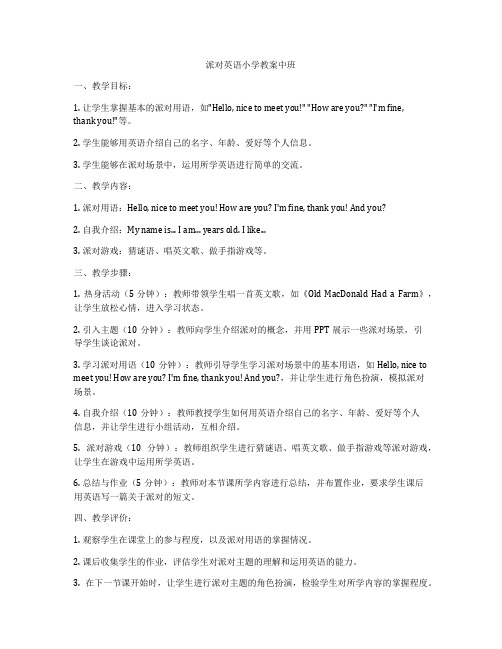
派对英语小学教案中班一、教学目标:1. 让学生掌握基本的派对用语,如"Hello, nice to meet you!" "How are you?" "I'm fine,thank you!"等。
2. 学生能够用英语介绍自己的名字、年龄、爱好等个人信息。
3. 学生能够在派对场景中,运用所学英语进行简单的交流。
二、教学内容:1. 派对用语:Hello, nice to meet you! How are you? I'm fine, thank you! And you?2. 自我介绍:My name is... I am... years old. I like...3. 派对游戏:猜谜语、唱英文歌、做手指游戏等。
三、教学步骤:1. 热身活动(5分钟):教师带领学生唱一首英文歌,如《Old MacDonald Had a Farm》,让学生放松心情,进入学习状态。
2. 引入主题(10分钟):教师向学生介绍派对的概念,并用PPT展示一些派对场景,引导学生谈论派对。
3. 学习派对用语(10分钟):教师引导学生学习派对场景中的基本用语,如Hello, nice to meet you! How are you? I'm fine, thank you! And you?,并让学生进行角色扮演,模拟派对场景。
4. 自我介绍(10分钟):教师教授学生如何用英语介绍自己的名字、年龄、爱好等个人信息,并让学生进行小组活动,互相介绍。
5. 派对游戏(10分钟):教师组织学生进行猜谜语、唱英文歌、做手指游戏等派对游戏,让学生在游戏中运用所学英语。
6. 总结与作业(5分钟):教师对本节课所学内容进行总结,并布置作业,要求学生课后用英语写一篇关于派对的短文。
四、教学评价:1. 观察学生在课堂上的参与程度,以及派对用语的掌握情况。
2. 课后收集学生的作业,评估学生对派对主题的理解和运用英语的能力。
八年级Unit3SectionA(1a-1c)说课稿

Unit 3 Could you please clean your room?Section A (1a1c)说课稿一、设计思路1、指导思想本节课选自新目标Go for it!人教版八年级英语下册第三单元的第一课时,本节内容是围绕“chores”这一话题展开,语言技能和语言知识都是依据这一中心话题而设计的。
重点在于通过听说来学习如何礼貌地提出请求和征求别人的许可,激发学生的兴趣,培养学生分担家务的习惯。
《英语课程标准》强调英语课程要从学生的学习兴趣,生活经验和认知水平出发,倡导体验、实践、参与、合作与交流的学习方式和任务型的教学途径,发展学生的综合英语运用能力。
基于课程标准的要求及学生的心理特点和认知发展规律,我设计了flash动画导入,情景会话,表演,个人点评等多种教学活动和方式来调动学生的学习兴趣;在教学策略方面采用了情境视听法、小组合作学习、任务型教学法,为学生设置真实的情景、语境,使学生在思考、交流、合作探究中学习和使用语言。
2、设计理念本节课在选材方面围绕“chores”的话题切入,非常贴近学生生活,有利于激起学生的英语学习热情。
体现了“从生活走向英语”的理念,运用flash动画、图片、声音媒体等手段教学,设置练习和实践所需的真实场景,营造良好的语言学习情景。
让学生感知英语的语言应用就在生活中。
引导学生透过对话练习,有效地培养了学生的英语语言技能,通过情感态度的培养,学生学会爱父母,爱家庭,爱劳动,学会如何与人交往,使他们的个性得到张扬。
3、教材分析本节课是新目go for it人教版八年级英语下册第三单元的第一课时。
本节课的中心话题是如何礼貌的请求对方做家务,通过谈论做家务,体会劳动的不易,培养做家务的习惯。
这一话题非常贴近学生生活实际,易于引发学生用英语进行交流。
学生通过对单词、短语、句型的学习以及对课件的观察和模仿,在实际操练中进一步提高了听力理解和综合运用语言的能力,且通过本节课的学习进一步培养了学生的合作意识、劳动意识,帮助学生学会关心他人,为父母分担家务的习惯。
人教版八年级英语下册教案Unit 3 第3课时
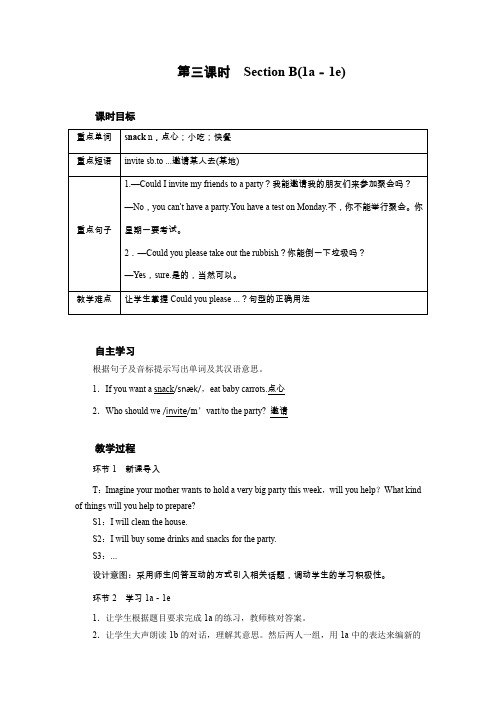
第三课时Section B(1a-1e)课时目标自主学习根据句子及音标提示写出单词及其汉语意思。
1.If you want a snack/snæk/,eat baby carrots.点心2.Who should we /invite/ɪn’vaɪt/to the party? 邀请教学过程环节1新课导入T:Imagine your mother wants to hold a very big party this week,will you help?What kind of things will you help to prepare?S1:I will clean the house.S2:I will buy some drinks and snacks for the party.S3:...设计意图:采用师生问答互动的方式引入相关话题,调动学生的学习积极性。
环节2学习1a-1e1.让学生根据题目要求完成1a的练习,教师核对答案。
2.让学生大声朗读1b的对话,理解其意思。
然后两人一组,用1a中的表达来编新的对话。
3.教师邀请几组学生当堂表演对话,并给予评价。
4.教师播放1c的录音,让学生在1a中勾出自己听到的事情,然后核对答案。
5.教师再次播放录音,让学生完成1d的表格,然后核对答案。
6.让学生大声朗读1e方框中的短语和对话,说出其意思。
然后两人一组,用方框中的短语编新的对话。
7.教师邀请几组学生当堂表演对话。
8.要点点拨。
(1)buy some drinks and snacks①buy v t.购买,买。
其过去式与过去分词均为bought。
它常接双宾语,即buy sb.sth.=buy sth.for sb.为某人买某物。
例:My mom bought me a bike.=My mom bought a bike for me.我妈妈为我买了一辆自行车。
【注意】当sth.为代词时,只能用buy sth.for sb.结构。
西方餐桌礼仪英语
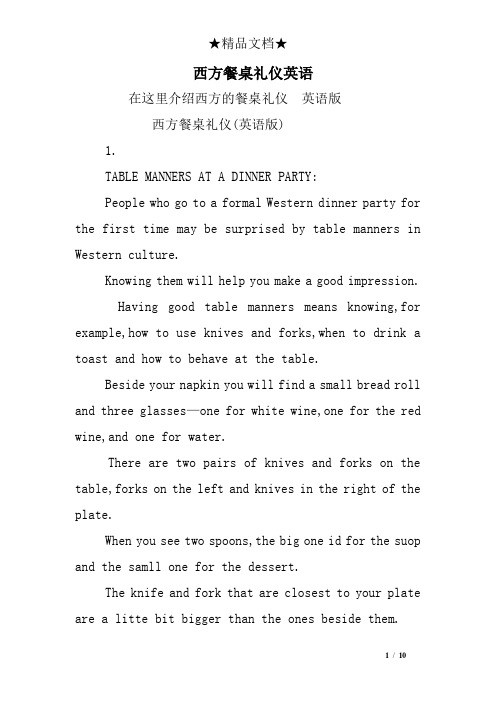
西方餐桌礼仪英语在这里介绍西方的餐桌礼仪英语版西方餐桌礼仪(英语版)1.TABLE MANNERS AT A DINNER PARTY:People who go to a formal Western dinner party for the first time may be surprised by table manners in Western culture.Knowing them will help you make a good impression.Having good table manners means knowing,for example,how to use knives and forks,when to drink a toast and how to behave at the table.Beside your napkin you will find a small bread roll and three glasses—one for white wine,one for the red wine,and one for water.There are two pairs of knives and forks on the table,forks on the left and knives in the right of the plate.When you see two spoons,the big one id for the suop and the samll one for the dessert.The knife and fork that are closest to your plate are a litte bit bigger than the ones beside them.When you sit down at the table, you can take your napkin, unfold it and put it on your lap.In Chinese you sometime get a hot,damp cloth to clean your face and face and hands,whinch,however,is nat the custom in Western countries.Dinner start with a small dish, which is often called a starter.Sime people pray before they start eating , and other people may keep silent for a moment.Then you can say”Enjoy your meal”to each other and everybody start eating.For the starter,which you eat with the smaller pair,you keep the knife in your right hand and the fork in your left.After the starter you will get a bowl of soup—but only one boel of soup and never ask for a seconf serving. The next dish is the main course.Many Westerners think the chicken breast with its tender white flesh is the best part of the bird.Some people can use their fingers when they eating chicken or other birds,but never touch beef or other meat in bones.It is polite to finish eating everthing on your plate,so don’t take more food than you need.At table ,you should try to speak quietly and smile a lot,but do not laugh all the time.Most Westerners like soft drink if they will drive home.Many of them drink white or red wine with the food. When drinking to someone’s health,you raise your glasses,but the glasses should not touch.The custom of toasting in some parts of China is to finish the drink at once,but Westerners usually take only a sip.For drinking during a dinner,the best advic is never to drink too much.Table manners change over time.They follow the fashion of the day .Beside,table manners are only important at formal dinner parties.If you’re not sure what to do ,you can always follow your hosts.Although good manners always make you look good,you do not need to worry about all these ruleswhile having dinner with your friends or family.2.Sit up straigh,keep your elbows off the table,and silence your cell phone.Dishes are passed from left to rightDo try a little of everything on your plateWhen a lady arrives or leaves the table,it‘s polite for all gentleman at the table of to stand up.Always say“Please“and “Thankyou“.Thank the host and hotess before leaving.3.Every culture in the world is equal, with no one being dominant or recessive to another.We should avoid using our own culture, morality and value to judge foreign culture.We should treat foreign culture objectively and comprehendly.内容提要本文主要讲中西方餐桌礼仪的不同点和相同点.在当今社会,随着中西方跨文化交流的平凡以及中西方礼仪的影响加深,导致双方餐桌礼仪方面的差异产生.本文着重于比较中西方在餐桌礼仪.例如,就餐是人们不同的入座方式,不同的饮食概念以及不同的餐具等等.此外还会指出不同国家中的一些用餐禁忌来帮助人们更好的理解餐桌礼仪。
英语人教版七年级下册Unit3 说课设计
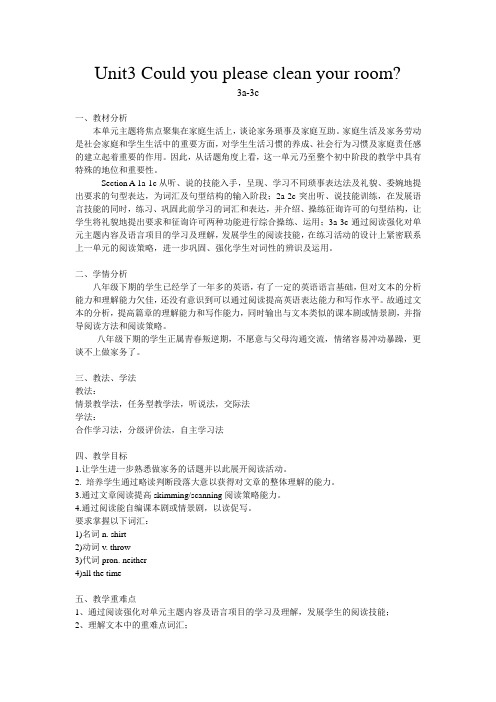
Unit3 Could you please clean your room?3a-3c一、教材分析本单元主题将焦点聚集在家庭生活上,谈论家务琐事及家庭互助。
家庭生活及家务劳动是社会家庭和学生生活中的重要方面,对学生生活习惯的养成、社会行为习惯及家庭责任感的建立起着重要的作用。
因此,从话题角度上看,这一单元乃至整个初中阶段的教学中具有特殊的地位和重要性。
Section A 1a-1c从听、说的技能入手,呈现、学习不同琐事表达法及礼貌、委婉地提出要求的句型表达,为词汇及句型结构的输入阶段;2a-2c突出听、说技能训练,在发展语言技能的同时,练习、巩固此前学习的词汇和表达,并介绍、操练征询许可的句型结构,让学生将礼貌地提出要求和征询许可两种功能进行综合操练、运用;3a-3c通过阅读强化对单元主题内容及语言项目的学习及理解,发展学生的阅读技能,在练习活动的设计上紧密联系上一单元的阅读策略,进一步巩固、强化学生对词性的辨识及运用。
二、学情分析八年级下期的学生已经学了一年多的英语,有了一定的英语语言基础,但对文本的分析能力和理解能力欠佳,还没有意识到可以通过阅读提高英语表达能力和写作水平。
故通过文本的分析,提高篇章的理解能力和写作能力,同时输出与文本类似的课本剧或情景剧,并指导阅读方法和阅读策略。
八年级下期的学生正属青春叛逆期,不愿意与父母沟通交流,情绪容易冲动暴躁,更谈不上做家务了。
三、教法、学法教法:情景教学法,任务型教学法,听说法,交际法学法:合作学习法,分级评价法,自主学习法四、教学目标1.让学生进一步熟悉做家务的话题并以此展开阅读活动。
2. 培养学生通过略读判断段落大意以获得对文章的整体理解的能力。
3.通过文章阅读提高skimming/scanning阅读策略能力。
4.通过阅读能自编课本剧或情景剧,以读促写。
要求掌握以下词汇:1)名词n. shirt2)动词v. throw3)代词pron. neither4)all the time五、教学重难点1、通过阅读强化对单元主题内容及语言项目的学习及理解,发展学生的阅读技能;2、理解文本中的重难点词汇;3、通过学生用不同语气朗读感知文本信息,提高英语语言敏感度,增强语感,进而体会感知父母的辛苦劳作。
经贸英语说课稿Unit3SocialCustom

经贸英语说课稿Unit3SocialCustom经贸英语说课稿 Unit 3 Social Custom在教学工作者实际的教学活动中,可能需要进行说课稿编写工作,认真拟定说课稿,那么大家知道正规的说课稿是怎么写的吗?下面是小编整理的经贸英语说课稿 Unit 3 Social Custom,欢迎大家分享。
一、说教学设想教育就是培养习惯—————叶圣陶二、说学情教学对象是经贸英语专业学生,班级女生居多,她们对英语学习有积极性,但是英语基础参差不齐,有些同学还比较羞怯,不敢主动参与口头的表达。
作为全国闻名的“侨乡”,泉州地区有很多的外贸企业,学生就读经贸专业本身就有将来从事涉外工作的意愿。
因此基础英语课应该与专业挂钩,体现“基础文化课为专业课服务”的理念。
针对上述情况,在课堂教学内容上,我会多提供一些与专业相关又能够实际运用的知识;在教学方法上,尽量灵活多样,充分调动学生的积极性,让学生能够参与到教学活动中来;针对班级人数不多的特点,刚好可以给予每个学生更多的机会进行口头练习和实际操练,使人人的交际能力都可以得到提高。
三、说教材1、教材内容及处理方法第一册的第三单元(Social Customs:A Dinner Party)第一节课,本单元以西方国家的“宴会、聚会”为话题开展教学活动。
主要是让学生了解掌握一些西方的社会文化和餐桌礼仪(Social Customs & Table manners),以及结合话题情境进行实际运用。
对于将来可能从事涉外工作的经贸英语专业的学生来说,本课的背景话题及能力目标都是比较具有实际意义的。
本节课是本单元的第一课,在忠实于教材的前提下,结合学生实际和专业特点,我将向学生介绍一些关于西方的社会文化和餐桌礼仪知识,并创设出一些实际情境,通过引导和鼓励学生运用本课所学重点句型、词汇,让她们进行模拟交际练习,使她们能够将所学知识转化为实际能力。
2、教学目标:(知识目标、能力目标、德育目标)知识目标:(1)了解西方的有关宴会、聚会上的一些习俗和禁忌(2)学习、掌握如何就一些西方文化、交际为背景征求意见和提出建议的句型。
化装舞会(教案)
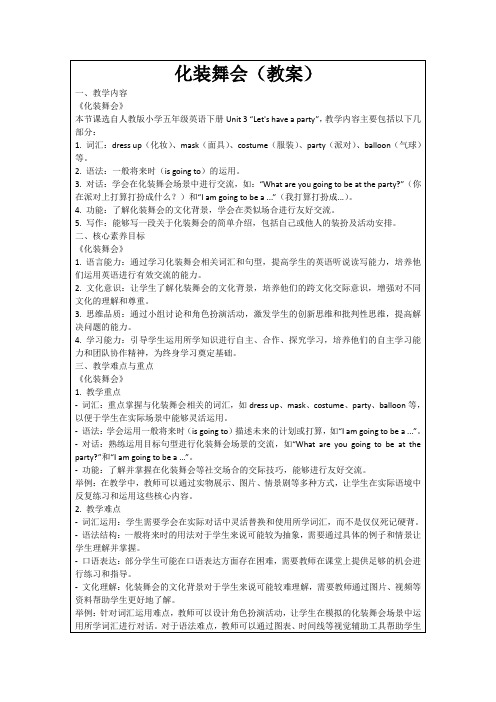
-文化理解:化装舞会的文化背景对于学生来说可能较难理解,需要教师通过图片、视频等资料帮助学生更好地了解。
举例:针对词汇运用难点,教师可以设计角色扮演活动,让学生在模拟的化装舞会场景中运用所学词汇进行对话。对于语法难点,教师可以通过图表、时间线等视觉辅助工具帮助学生理解一般将来时的结构。在口语表达方面,教师可以组织小组讨论,鼓励学生大胆开口,并提供即时反馈。至于文化理解,教师可以通过展示不同国家和文化的化装舞会图片,让学生对比分析,从而加深理解。
4.学习能力:引导学生运用所学知识进行自主、合作、探究学习,培养他们的自主学习能力和团队协作精神,为终身学习奠定基础。
三、教学难点与重点
《化装舞会》
1.教学重点
-词汇:重点掌握与化装舞会相关的词汇,如dress up、mask、costume、party、balloon等,以便于学生在实际场景中能够灵活运用。
二、核心素养目标
《化装舞会》
1.语言能力:通过学习化装舞会相关词汇和句型,提高学生的英语听说读写能力,培养他们运用英语进行有效交流的能力。
2.文化意识:让学生了解化装舞会的文化背景,培养他们的跨文化交际意识,增强对不同文化的理解和尊重。
3.思维品质:通过小组讨论和角色扮演活动,激发学生的创新思维和批判性思维,提高解决问题的能力。
3.对话:学会在化装舞会场景中进行交流,如:“What are you going to be at the party?”(你在派对上打算打扮成什么?)和“I am going to be a ...”(我打算打扮成...)。
4.功能:了解化装舞会的文化背景,学会在类似场合进行友好交流。
Unit3FestivalsandcustomsGrammarandusage教案-高中英语译林版(
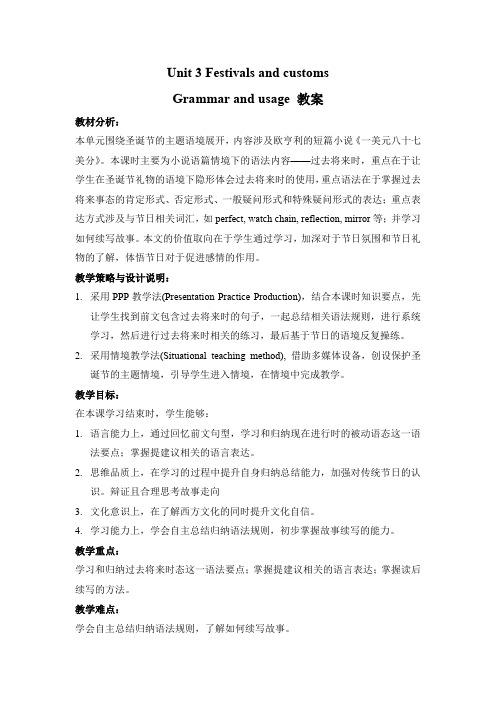
Unit 3 Festivals and customsGrammar and usage 教案教材分析:本单元围绕圣诞节的主题语境展开,内容涉及欧亨利的短篇小说《一美元八十七美分》。
本课时主要为小说语篇情境下的语法内容——过去将来时,重点在于让学生在圣诞节礼物的语境下隐形体会过去将来时的使用,重点语法在于掌握过去将来事态的肯定形式、否定形式、一般疑问形式和特殊疑问形式的表达;重点表达方式涉及与节日相关词汇,如perfect, watch chain, reflection, mirror等;并学习如何续写故事。
本文的价值取向在于学生通过学习,加深对于节日氛围和节日礼物的了解,体悟节日对于促进感情的作用。
教学策略与设计说明:1.采用PPP教学法(Presentation Practice Production),结合本课时知识要点,先让学生找到前文包含过去将来时的句子,一起总结相关语法规则,进行系统学习,然后进行过去将来时相关的练习,最后基于节日的语境反复操练。
2.采用情境教学法(Situational teaching method), 借助多媒体设备,创设保护圣诞节的主题情境,引导学生进入情境,在情境中完成教学。
教学目标:在本课学习结束时,学生能够:1.语言能力上,通过回忆前文句型,学习和归纳现在进行时的被动语态这一语法要点;掌握提建议相关的语言表达。
2.思维品质上,在学习的过程中提升自身归纳总结能力,加强对传统节日的认识。
辩证且合理思考故事走向3.文化意识上,在了解西方文化的同时提升文化自信。
4.学习能力上,学会自主总结归纳语法规则,初步掌握故事续写的能力。
教学重点:学习和归纳过去将来时态这一语法要点;掌握提建议相关的语言表达;掌握读后续写的方法。
教学难点:学会自主总结归纳语法规则,了解如何续写故事。
教学资源:教材、多媒体课件、黑板与粉笔。
教学过程:备注:Ss: Students T: TeacherIW: Individual work GW: Group work CW: Class work教学反思1.通过本节内容学习,学生是否掌握过去将来时,把握材料大意;2.通过本节内容学习,学生能否掌握归纳总结读后续写的写作方法。
- 1、下载文档前请自行甄别文档内容的完整性,平台不提供额外的编辑、内容补充、找答案等附加服务。
- 2、"仅部分预览"的文档,不可在线预览部分如存在完整性等问题,可反馈申请退款(可完整预览的文档不适用该条件!)。
- 3、如文档侵犯您的权益,请联系客服反馈,我们会尽快为您处理(人工客服工作时间:9:00-18:30)。
书山有路勤为径;学海无涯苦作舟
Unit 3 Social Custom: A Dinner Party 说课稿
Unit3SocialCustom:ADinnerParty说课稿
一、说教学设想
教育就是培养习惯-----叶圣陶
二、说学情
教学对象是经贸英语专业学生,班级女生居多,她们对英语学习有积极性,但是英语基础参差不齐,有些同学还比较羞怯,不敢主动参与口头的表达。
作为全国闻名的“侨乡”,泉州地区有很多的外贸企业,学生就读经贸
专业本身就有将来从事涉外工作的意愿。
因此基础英语课应该与专业挂钩,体现“基础文化课为专业课服务”的理念。
针对上述情况,在课堂教
学内容上,我会多提供一些与专业相关又能够实际运用的知识;在教学方法上,尽量灵活多样,充分调动学生的积极性,让学生能够参与到教学活动中来;针对班级人数不多的特点,刚好可以给予每个学生更多的机会进行口头练习和实际操练,使人人的交际能力都可以得到提高。
三、说教材
1、教材内容及处理方法
第一册的第三单元(SocialCustoms:ADinnerParty)第一节课,本单元
以西方国家的“宴会、聚会”为话题开展教学活动。
主要是让学生了解掌
握一些西方的社会文化和餐桌礼仪(SocialCustoms&Tablemanners),以及结合话题情境进行实际运用。
对于将来可能从事涉外工作的经贸英语专业的学生来说,本课的背景话题及能力目标都是比较具有实际意义的。
本节课是本单元的第一课,在忠实于教材的前提下,结合学生实际和专
专注下一代成长,为了孩子。
